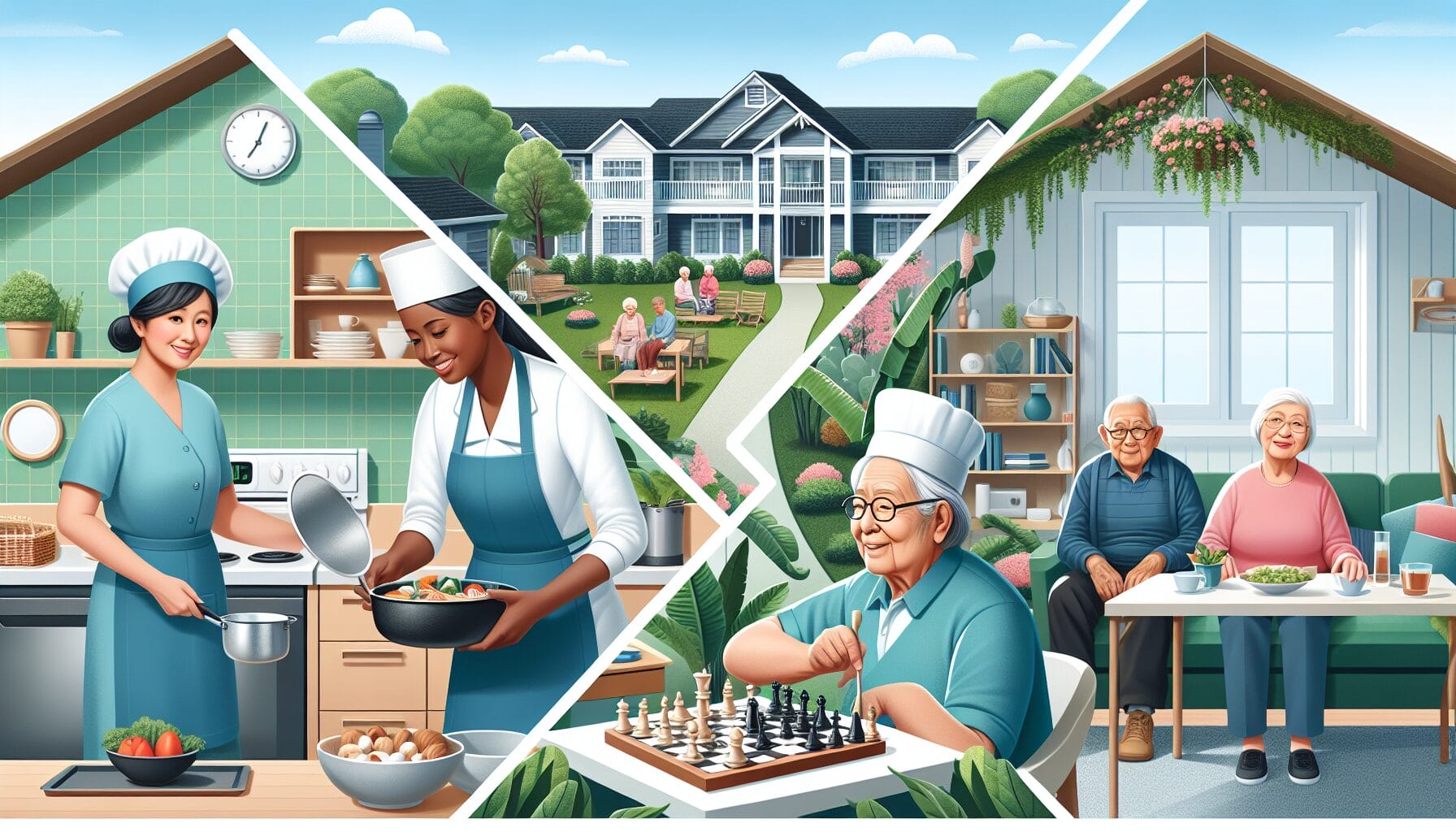Googling ‘senior home care near me’ typically means you need trustworthy, quality care options for an aging loved one, and you need them close to home. In this guide, we walk you through how to find and assess local senior home care services, making sure your family members receive the personalized, compassionate care they deserve without having to navigate far from familiar surroundings.
Key Takeaways
Comprehensive assessment of senior home care providers includes accreditation, staff training, services range, and cost, with the aim of finding high-quality, personalized care.
Professional caregivers significantly improve seniors’ quality of life at home, offering a range of services from personal care to 24-hour assistance, with thorough background checks and ongoing training.
Customized care plans, tailored support like respite care for family members, and technology integration in home care services empower seniors to live independently and safely in their own homes.
Discover Local Senior Home Care Options

Several avenues can be explored to find the best local home care services for seniors, such as online directories, referrals from healthcare professionals, or local aging agencies. Evaluating the range of services, staff qualifications, cost implications, and the provider’s reputation is of utmost importance.
A clear understanding of the differences between non-medical home care services and home health care services is key. When choosing the right home care service, a thorough assessment of the following factors is required:
Accreditation or licensing
Staff training quality
Service range
Care plan customization
Availability
References
Cost
Personalized In-Home Care Services
Personalized in-home care services significantly enhance a senior’s quality of life. This is usually provided by a caregiver employed by a home care agency. Working with an agency, while more costly, has several benefits, including robust staffing options and proper insurance to reduce your liability. The best home care agencies will offer robust personal care services, assisting with tasks such as:
Personal hygiene
Toileting, Dressing, and Bathing
Medication reminders
Meal preparation
Light housekeeping
Laundry
Trained caregivers provide both physical and emotional support through daily assistance, while also maintaining open communication with doctors and family members.
These in-home care services can be adapted to accommodate individual care preferences, ensuring seniors receive personalized and sensitive care.
The Importance of Professional Caregivers

Professional caregivers significantly enhance the safety and comfort of seniors, thereby improving their quality of life at home. At 2nd Family, we provide caregivers who offer expert guidance and experience, ensuring loved ones are safe, comfortable, and content in their own homes. From a few hours per week to 24-hour care, seniors are able to maintain a sense of independence, being encouraged to perform activities on their own when it is safe to do so.
Rigorous Background Checks
Caregivers undergo background checks to confirm their qualifications, ensure client safety, and establish their integrity and trustworthiness. Such checks are vital for roles involving vulnerable populations such as the elderly or disabled, ensuring competent and reliable care. The focus of these checks includes:
Misdemeanors and felonies related to violent crimes
Sexual offenses
Healthcare fraud
Drug abuse
Additionally, they involve verifying a candidate’s employment history, education, and qualifications to assess their suitability for the caregiving role.
Ongoing Training and Support
Caregivers at all levels require training to keep abreast of the latest regulations and research in age-related illnesses. Online courses provide caregivers with the flexibility to incorporate continuing education into their schedules. Most caregivers complete Continuing Education Units (CEUs) as part of their ongoing training to maintain their qualifications and boost their capabilities.
Tailored Care Plans for Aging Adults
A collaborative effort involving the senior client, their family, and the professional care team is employed to create personalized care plans for aging adults, ensuring that each plan caters to the unique needs of the individual. To cater to the changing needs of seniors, an initial assessment is done to determine the level of care needed, which is followed by regular reevaluations and modifications to the care plan as their capabilities and requirements change over time.
Care plans may encompass a range of specific personal care and home care services based on the individual’s needs, including:
Household chores
Errands
Transportation
Personal care and hygiene assistance
Dressing, Bathing, and Toileting
Mobility help
Activities of daily living such as meal preparation and housekeeping
Specialized Dementia Care at Home
For those seniors grappling with the challenges of Alzheimer’s or dementia, receiving care in the familiar surroundings of their own home can be particularly beneficial. At-home dementia care focuses on creating a safe, supportive, and consistent environment that can help to reduce confusion and anxiety for individuals with memory impairment. Caregivers trained in dementia care are equipped with strategies to manage the unique needs of these seniors, such as maintaining routines, using memory aids, and engaging in cognitive stimulation activities.
We also offer respite for family members, providing them with peace of mind that their loved one is receiving compassionate and specialized attention. Tailored to the individual’s stage of dementia, in-home care services can include assistance with daily living activities, medication reminders, personal care, and companionship, all while fostering dignity and quality of life as we help to manage any cognitive decline.
Companion Care and Social Engagement

Establishing a strong caregiver-patient relationship is a key element of personalized care. This involves:
Gaining an understanding of the patient’s personality, interests, and hobbies to foster a deeper connection
Companionship, which combats loneliness and promotes mental and physical health in older adults
Contributing to maintaining cognitive functions and preventing dementia
Encouraging self-care that fights off depression
Seniors receiving emotional benefits such as feeling valued, safe, and fulfilled through socialization
Enjoyment of life experiences that improve overall quality of life
Home care offers one-on-one companion services, which can be tailored to the individual’s own lifestyle and preferences, ensuring personalized comfort at home. Through home care services, seniors have social opportunities to entertain guests and engage with caregivers, helping to reduce feelings of isolation. We have found this to of great relief to a family member who worries about their elderly loved one being alone too often.
Respite Care for Family Members
Respite care offers a necessary respite for family caregivers, especially those caring for individuals with dementia, a role that often presents multifaceted, complex, and high-stress challenges. Introducing respite care plays a significant role in building caregiver resilience, enabling them to better cope with the stress and demands of caregiving. There is flexibility in respite care programs, such as adult day care and in-home aide assistance, to meet the varying needs of caregivers.
The benefits of respite care include:
Allowing family caregivers to take time for themselves
Providing relief and companionship for caregivers experiencing isolation
Preventing burnout and maintaining mental health for caregivers
Ensuring consistent care for the senior through customized care plans
Allowing family caregivers to recharge, leading to better care upon their return
Respite care is a tailored approach that prioritizes the well-being of both the caregiver and the care recipient.
Expert Geriatric Care Managers
In home care agencies often work closely with Geriatric care managers. A Geriatric care manager can be a wonderfully knowledgeable and independent resource for those who aren’t sure which senior care option is best for their loved on. Some services offered by Geriatric care managers include:
Identifying their needs
Crafting personalized care plans
Coordinating healthcare and housing services
Encouraging family involvement in care decisions
They act as vital liaisons, ensuring the care received by seniors is appropriate, well-coordinated, and improves their quality of life through efficient communication among all parties involved.
With professional backgrounds in nursing, social work, or gerontology, geriatric care managers bring specialized expertise to assisting older adults and their families in managing long-term care needs. As a geriatric care manager, their expertise aids families in navigating the complexities of elderly care, significantly reducing stress for families and leading to better, more consistent quality of care for the seniors.
Transportation Solutions for Seniors

Senior shuttles and paratransit services offer secure, convenient, and accessible transportation for seniors within their communities, fostering independence and social interactions. Some benefits of these services include:
Reliable transportation to run errands, attend social events, and visit friends and family
Access to medical appointments and healthcare services through medical transportation services
Personalized transport and opportunities for social engagement through volunteer driver programs
These transportation options are designed to meet the specific needs of seniors and help them maintain an active and fulfilling lifestyle.
Tailoring these transportation options and incorporating them into a comprehensive care plan can help seniors maintain their independence and meet their various mobility needs.

Navigating Home Health Services
Often there is confusion between home care and home health care. Home health care provides a broad spectrum of services for managing illness or injury within the comfort of a person’s home, often serving as a convenient and less costly alternative to hospital or skilled nursing facility care. Services provided by home health care professionals may include:
Wound care
Education for patient and caregiver
Intravenous or nutrition therapy
Injections
Monitoring of serious illness and unstable health status
Customized care plans provided by home health services must take into account safety precautions and potential adjustments due to external circumstances, such as the COVID-19 pandemic.
Coordination with Healthcare Providers
Effective care coordination is central to addressing patients’ needs and preferences, thereby delivering high-quality, high-value healthcare. It has been identified by the Institute of Medicine as a primary strategy to improve the usability, safety, and efficiency of the healthcare system. Healthcare providers and home health aides are in an interdependent relationship, where aides execute care plans while relying on providers for actionable guidance and updates. Collaborative efforts between home health aides and healthcare providers result in more effective management of patients’ health and lead to enhanced outcomes.
Effective care coordination encompasses a broad set of activities including team-based care, management plans, technology use, and patient-focused health approaches. Activities central to care coordination are establishing roles and accountability, facilitating communication, helping in healthcare transitions, and supporting patient goals.
Home health care requires a doctor to write and regularly review a patient care plan, ensuring that the home health staff see the patient as often as medically necessary. However, obstacles like fragmented care systems, unclear referral processes, and inconsistent information sharing between primary care and specialists pose challenges to effective care coordination.
Managing Chronic Conditions at Home
For seniors with chronic conditions, particularly those with cognitive disorders like dementia, being in their own homes can provide comfort and alleviate anxiety. Effective care for chronic illnesses at home requires coordination between home health aides and healthcare professionals, ensuring proper care plan implementation and healthy patient outcomes. Home care services for chronic illness are able to adjust to the individual’s changing health needs by altering the frequency of visits and incorporating new therapies as needed.
In-home care allows for personalized safety measures like medication reminders, and the close health monitoring by caregivers can facilitate timely medical interventions. Cost management for chronic conditions becomes more manageable with home care through tailored hiring of caregivers for specific hours or tasks, serving as a cost-effective alternative to prolonged hospital stays. Moreover, caregivers receive ongoing training to meet state requirements and ensure the highest quality of care for seniors with chronic conditions.
Local Area Agencies and Community Resources
Area Agencies on Aging, also known as local area agency, provide a broad array of services, which may encompass:
Access to legal services
Health insurance counseling
Assistance with benefits
Guidance on various financial and legal issues that older adults face.
Educational resources such as the Care Coordination Quality Measure for Primary Care (CCQM-PC) and the Care Coordination Measures Atlas are available for those wanting to learn about coordinated care. Subsidized respite care services are accessible through local agencies, which can help manage caregiving-related out-of-pocket expenses.
Linking with Social Workers and Advisors
Financial advisors specializing in eldercare are instrumental in aiding families to comprehend the financial aspects of senior care planning. These advisors provide essential guidance on managing costs associated with senior home care and aid in preparing for future healthcare needs.
Long-term care insurance can be a vital resource for families, as it can be used to cover the costs associated with hiring geriatric care managers, thus affording flexibility and aid in money management.
Accessing Nutritious Meals and Home Services
Nutritious meals and home services, including grocery shopping, can be accessed through local agencies and programs.
Programs such as Meals on Wheels enhance the quality of life for seniors by delivering nutritious meals to those who are homebound or find food preparation challenging.
Making Life Easier with Home Care Assistance
A majority of Americans, 90%, express the desire to age in their own homes, and caregivers play a key role in facilitating a comfortable and safe lifestyle in this preferred environment. Home care assistance provides the necessary support for daily activities and medical needs, allowing seniors to enjoy the familiarity and comfort of their own living spaces. Additionally, this option promotes continuity and stability in their lives, which is often crucial for their emotional and mental well-being as they age.
Flexible Scheduling for Families
Home care providers maintain a large network of caregivers who can accommodate various schedules including nights, weekends, and holidays. Caregivers are available on an as-needed basis, providing flexibility for seniors who may not require daily assistance. Families can schedule care sessions for a few hours a day to full-time, live-in care depending on their unique circumstances.
Emergency or last-minute scheduling is possible to accommodate sudden changes in family availability or unexpected events. Senior home care services are customizable, allowing families to decide on the number of days per week and hours per visit that suit their needs.
Leveraging Senior Care Technology with 2nd Family
At 2nd Family, we understand the importance of staying connected and informed about your loved one’s care. That’s why we’ve embraced technology to enhance our senior care services. Our innovative family portal is a prime example of this, offering a centralized online hub where families can easily manage and stay updated on various aspects of the care process.
Through our family portal, you have access to a wealth of information and tools at your fingertips:
Invoices and Payments: Quickly view and manage invoices, update payment information, and keep track of expenses, all in one secure location.
Care Schedules: Stay informed about past shift data and any upcoming schedules, ensuring you’re always in the loop about your loved one’s care routine.
Caregiver Information: View your assigned caregiver’s picture and profile, fostering a sense of trust and familiarity with the person providing care to your family member.
Schedule Management: Easily request schedule changes as needed, offering flexibility and convenience for your family’s dynamic needs.
By integrating this technology into our services, 2nd Family makes life easier for families, giving them peace of mind and the ability to actively participate in the caregiving experience.
Finding the right ‘senior home care near me’ service is no small task, but with the right guidance and resources, it is definitely achievable. Whether it’s in-home care, transportation solutions, or assistance with managing chronic conditions at home, there’s an option out there that can cater to the specific needs of your loved ones. And with the increasing integration of technology into home care services, the possibilities for enhancing the quality of life for seniors are more exciting than ever before.
Frequently Asked Questions
What happens if elderly person has no one to care for them?
If an elderly person has no one to care for them, they can seek assistance from local government agencies that provide programs offering financial aid, home-delivered meals, transportation services, and access to healthcare resources. These programs are designed to support elderly individuals in such situations.
Do I need to pay for senior home care services?
When considering senior home care services, understanding the available payer sources is crucial. Payer sources can include private pay, long-term care insurance, Medicare, Medicaid, and sometimes veterans’ benefits. Each source has its own eligibility criteria and scope of coverage:
Private Pay: The individual or their family pays for home care services out-of-pocket. This is often used when other forms of payment are not available or do not cover the desired services.
Long-Term Care Insurance: This insurance typically covers services that Medicare and Medicaid do not, such as assistance with activities of daily living (ADLs). Policies can vary greatly, so it’s important to understand what your policy covers.
Medicare: Generally covers only short-term, medically necessary home health care services prescribed by a doctor. It does not cover ongoing personal care services.
Medicaid: Coverage varies by state, but it may include long-term home care services for individuals who qualify financially and meet the level of care requirements.
Veterans’ Benefits: For qualifying veterans and their spouses, the Department of Veterans Affairs may offer benefits that cover some home care services.
It’s vital to research and understand these payer sources to determine which can be utilized for your specific situation.
What are some ways to find local senior home care options?
You can find local senior home care services through online directories, referrals from healthcare professionals, or by reaching out to local aging agencies. Try these methods to explore the options available to find services in your area.
What is the role of geriatric care managers?
Geriatric care managers assess the needs of older adults, coordinate healthcare and housing services, and encourage family participation in care decisions. They play a vital role in ensuring comprehensive care for older adults.
Who manages the care provided by 2nd Family?
At 2nd Family, care is meticulously managed by our dedicated RN Care Coordinators. These professionals are responsible for overseeing every aspect of home care, ensuring that each client receives the highest quality of personalized service tailored to their specific needs.